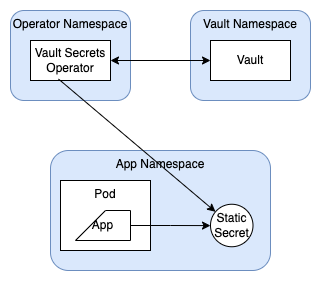Table of Contents
- Introduction
- Troubleshooting workflow phases
- Common error messages
- Data Collection for further Troubleshooting
- Further Reading
Introduction
The Vault Secrets Operator is a Kubernetes Operator that syncs secrets between Vault and Kubernetes and allows Pods to consume Vault secrets directly as native Kubernetes Secrets.
A Kubernetes Operator is a software extension that uses custom resources to manage applications hosted on Kubernetes.
From VSO Tutorial

It's helpful to think of troubleshooting VSO into the phases of the VSO workflow:
- Pod state: is
vault-secrets-operator-controller-managerpod running - Vault Connection: Is the pod able to connect to Vault
- Vault authentication: Is the pod able to authenticate to Vault
- Secret Syncing: Is the pod able to sync the secret
- App Consumption: Can the app pod consume the native k8s secret
Troubleshooting workflow phases
Pod State
Is the pod running when running? Verify status with:
- kubectl get pods
- kubectl describe pod <vault-secrets-operator-controller-manager-uniq>
CrashLoopBackOff
VSO pod in this condition? Then describe the pod to look at the Last State reasons:
State: Waiting
Reason: CrashLoopBackOff
Last State: Terminated
Reason: OOMKilled
Exit Code: 137
OOMKilled
If your pods are running into OOM, consider increasing limits & requests values for the VSO container resources.
If your pod is running, consider the workflow
Vault Connection
- Is the vaultconnections CRD yaml configured correctly?
- Check the connection to
VAULT_ADDRfrom pod using tools like curl, netcat, othertcp connectivity tools/methods - Describe the VSO pod and review for clues / next steps
Vault Authentication
- Is the vaultauths CRD yaml configured correctly?
- Does the vault kubernetes authentication work?
- test the authentication: vault write auth/kubernetes/login role=${your_role} jwt=...
- Auth failing? Check auth method configuration & role:
vault read auth/${kubernetes}/configvault read auth/${kubernetes}/role/${role_name}
Secret Syncing
- Confirm sync status in pod logs
- kubectl logs <vso-controller-pod>
- Review YAML files from the secret type(s) being used (ie - static, dynamic, pki, etc)
App Consumption
Check for underlying issues with app pods consuming the secrets
Common error messages
Permission Denied
- Make sure the auth configured for VSO has needed permissions for the secret being synced
- Check policy permissions for your secret type. Some will only require read, some will require update, etc.
- Make sure the auth configured for VSO is working (See Vault Authentication section above)
Failed to get Vault client
Ensure all CRD's are configured properly. This could stem from not configuring VaultAuth CRD, but having VaultConnection & secrets CRDs configured.
Data Collection for further Troubleshooting
Need further help troubleshooting? When engaging with Support please share the following data in text output:
Data to collect for sharing with Support - click to expand
// Commands to run to gather relevant data to share with Support
// Kubernetes version
kubectl version
// Share environment running VSO
EKS, OpenShift, GKE, etc
// Share VaultConnection CRD information
kubectl get vaultconnection -A -o yaml
// Share VaultAuth CRD information
kubectl get vaultauth -A -o yaml
// Share confirmation Vault authentication works. Redact any sensitive info
vault write auth/kubernetes/login role=${your_role} jwt=...
// Describe the VSO pod and share output
kubectl describe pods <vault-secrets-operator-controller-manager-uniq-string>
// If Vault Authentication is failing, provide sanitized output of the following
vault read auth/${kubernetes}/config
vault read auth/${kubernetes}/role/${role_name}
// Share pod logs
kubectl logs <vso-controller-pod>
// Share CRD YAML configuration for secrets. Share output from CRD's used
kubectl get vaultdynamicsecret -A -o yaml
kubectl get vaultstaticsecret -A -o yaml
kubectl get vaultpkisecret -A -o yaml
kubectl get secrettransformation -A -o yaml
Further Reading
Vault Secrets Operator documentation
HashiCorp GitHub repository for VSO
